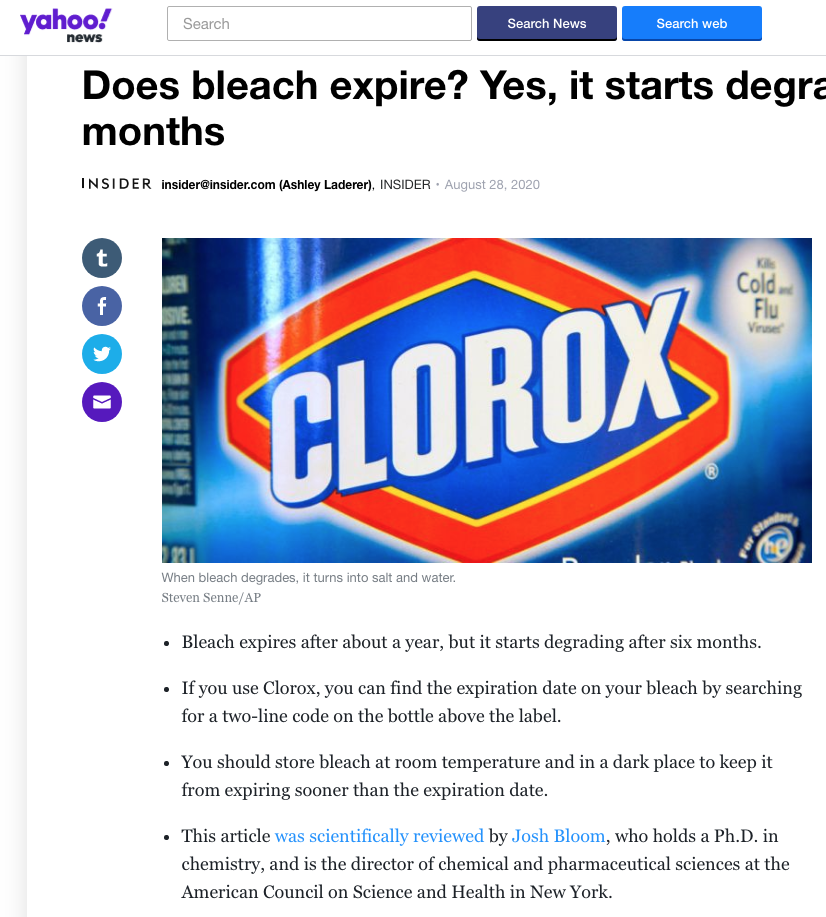Does Bleach Expire? Yes, It Starts Degrading After Six Months –– This article on the chemical stability of ordinary household bleach received the thumbs-up from our Dr. Josh Bloom, who scientifically reviewed it for the website Insider. (See bottom of the image below.) Readers of this column may recall that earlier this year Dr. Bloom and Dr. Alex Berezow accepted invitations to join Insider's Medical Review Board.
This article also was prominently posted on Yahoo! News, where it was seen by tens of millions of readers. So if you weren't one of them, it might be wise to give it a quick read and then poke your head under the sink to check out the expiration date on your bottle.

Do Air Purifiers Really Work (and Will They Protect You From COVID-19)? –– Readers of MSN News came across this piece, which referenced the American Council and featured an expansive quote from Dr. Berezow, who authored a recent article on the topic. "Living within the tiny air sacs in your lungs (called alveoli) are immune cells known as macrophages," he wrote about our efficient, human respiratory system, which for relatively healthy folks eliminates the need for mechanical purifiers. "These 'big eaters' gobble up bacteria, viruses, fungi, and whatever other debris happens to find its way into the lungs."
And let's not overlook coverage of air purifiers that ACSH received in The Manila Times. “Unless you have some sort of medical condition (asthma, allergies)," as Dr. Berezow was quoted in the Philippines-based newspaper, "I just don’t think an air purifier is worth the money.”
Virus Risk Compels Big Ten, Pac-12 to Cancel Fall College Football Seasons –– A recent article in The Washington Times mentioned ACSH and cited statistics from a recent article about Under-Aged-25 fatalities linked to COVID-19.
A Must-Have Tool for Living on Campus (UV Light Sanitizer Wand) –– As New York magazine reported mid-month on its website while referencing us, giving students returning to college a device that can kill germs "on common surfaces, like shared computer terminals" is a smart idea. “As microbiologist Alex Berezow told the Strategist [column], ‘UV light is lethal to bacteria and viruses because of its high frequency that scrambles and damages their nuclear material.’"
Kirby Wilbur Radio Show –– On August 25, Dr. Berezow appeared on the Seattle-based talk show Kirby Nation on KVI. He discussed his recent article on lithium in drinking water and its connection to depression, and separately, the topic of how artificial intelligence could potentially be used to effectively diagnose cancer. (Click the link to hear the interview, which begins at 24:45.)
Pain is pain, regardless of which side of America's northern border it's found. And expert advice on the topic is essential. In a press release issued by the Chronic Pain Association of Canada, titled It’s Time for Health Canada to Admit Errors, Deception and Move Forward, the painstaking work of Dr. Bloom was featured. The CPAC praised his body of work in this area, consisting of 65 articles, "revealing the untruths and trickery" that currently exist within Canada's opioid policy.
Deaths Are an Incomplete Measure of COVID-19's Impact –– The website Breast Cancers.com trained its spotlight on an article on this topic co-written by Dr. Bloom and Dr. Henry Miller for ACSH.org.
On Aug. 5, Dr. Berezow appeared on the Chicago radio program, The Morning Answer on AM560, discussing the federal government's response to the COVID-19 pandemic.
And finally ...
Man Pleads Guilty to Trying to Buy Deadly Chemical Online –– You could say that our scientific work even contributes to crime-fighting. In early August, KMIZ, the ABC-TV affiliate in Missouri, reported on its website that a document from the U.S. attorney's office "references an American Council on Science and Health article on Karen Wetterhahn, a Dartmouth College professor who died after exposure to drops of dimethylmercury." Dr. Bloom, who built his career as a prominent research chemist for 25 years before joining ACSH, may have written the piece in 2016. But his expertise is continuing to pay dividends, apparently assisting law enforcement years later.





